7 start with B start with B
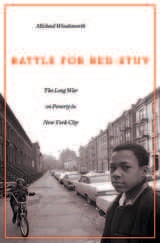
Half a century after the launch of the War on Poverty, its complex origins remain obscure. Battle for Bed-Stuy reinterprets President Lyndon Johnson’s much-debated crusade from the perspective of its foot soldiers in New York City, showing how 1960s antipoverty programs were rooted in a rich local tradition of grassroots activism and policy experiments.
Bedford-Stuyvesant, a Brooklyn neighborhood housing 400,000 mostly black, mostly poor residents, was often labeled “America’s largest ghetto.” But in its elegant brownstones lived a coterie of home-owning professionals who campaigned to stem disorder and unify the community. Acting as brokers between politicians and the street, Bed-Stuy’s black middle class worked with city officials in the 1950s and 1960s to craft innovative responses to youth crime, physical decay, and capital flight. These partnerships laid the groundwork for the federal Community Action Program, the controversial centerpiece of the War on Poverty. Later, Bed-Stuy activists teamed with Senator Robert Kennedy to create America’s first Community Development Corporation, which pursued housing renewal and business investment.
Bed-Stuy’s antipoverty initiatives brought hope amid dark days, reinforced the social safety net, and democratized urban politics by fostering citizen participation in government. They also empowered women like Elsie Richardson and Shirley Chisholm, who translated their experience as community organizers into leadership positions. Yet, as Michael Woodsworth reveals, these new forms of black political power, though exercised in the name of poor people, often did more to benefit middle-class homeowners. Bed-Stuy today, shaped by gentrification and displacement, reflects the paradoxical legacies of midcentury reform.
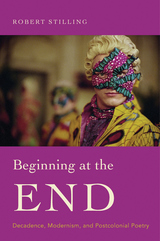
During the struggle for decolonization, Frantz Fanon argued that artists who mimicked European aestheticism were “beginning at the end,” skipping the inventive phase of youth for a decadence thought more typical of Europe’s declining empires. Robert Stilling takes up Fanon’s assertion to argue that decadence became a key idea in postcolonial thought, describing both the failures of revolutionary nationalism and the assertion of new cosmopolitan ideas about poetry and art.
In Stilling’s account, anglophone postcolonial artists have reshaped modernist forms associated with the idea of art for art’s sake and often condemned as decadent. By reading decadent works by J. K. Huysmans, Walter Pater, Henry James, and Oscar Wilde alongside Chinua Achebe, Derek Walcott, Agha Shahid Ali, Derek Mahon, Yinka Shonibare, Wole Soyinka, and Bernardine Evaristo, Stilling shows how postcolonial artists reimagined the politics of aestheticism in the service of anticolonial critique. He also shows how fin de siècle figures such as Wilde questioned the imperial ideologies of their own era.
Like their European counterparts, postcolonial artists have had to negotiate between the imaginative demands of art and the pressure to conform to a revolutionary politics seemingly inseparable from realism. Beginning at the End argues that both groups—European decadents and postcolonial artists—maintained commitments to artifice while fostering oppositional politics. It asks that we recognize what aestheticism has contributed to politically engaged postcolonial literature. At the same time, Stilling breaks down the boundaries around decadent literature, taking it outside of Europe and emphasizing the global reach of its imaginative transgressions.

For most Americans today, Roe v. Wade concerns just one thing: the right to choose abortion. But the Supreme Court’s decision once meant much more. The justices ruled that the right to privacy encompassed the abortion decision. Grassroots activists and politicians used Roe—and popular interpretations of it—as raw material in answering much larger questions: Is there a right to privacy? For whom, and what is protected?
As Mary Ziegler demonstrates, Roe’s privacy rationale attracted a wide range of citizens demanding social changes unrelated to abortion. Movements questioning hierarchies based on sexual orientation, profession, class, gender, race, and disability drew on Roe to argue for an autonomy that would give a voice to the vulnerable. So did advocates seeking expanded patient rights and liberalized euthanasia laws. Right-leaning groups also invoked Roe’s right to choose, but with a different agenda: to attack government involvement in consumer protection, social welfare, racial justice, and other aspects of American life.
In the 1980s, seeking to unify a fragile coalition, the Republican Party popularized the idea that Roe was a symbol of judicial tyranny, discouraging anyone from relying on the decision to frame their demands. But Beyond Abortion illuminates the untapped potential of arguments that still resonate today. By recovering the diversity of responses to Roe, and the legal and cultural battles it energized, Ziegler challenges readers to come to terms with the uncomfortable fact that privacy belongs to no party or cause.
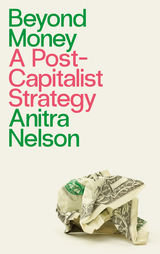
What would a world without money look like? This book is a lively thought experiment that deepens our understanding of how money is the driver of political power, environmental destruction and social inequality today, arguing that it has to be abolished rather than repurposed to achieve a postcapitalist future.
Grounded in historical debates about money, Anitra Nelson draws on a spectrum of political and economic thought and activism, including feminism, ecoanarchism, degrowth, permaculture, autonomism, Marxism and ecosocialism. Looking to Indigenous rights activism and the defense of commons, an international network of activists engaged in a fight for a money-free society emerges.
Beyond Money shows that, by organizing around post-money versions of the future, activists have a hope of creating a world that embodies their radical values and visions.
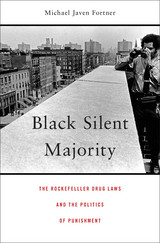
Often seen as a political sop to the racial fears of white voters, aggressive policing and draconian sentencing for illegal drug possession and related crimes have led to the imprisonment of millions of African Americans—far in excess of their representation in the population as a whole. Michael Javen Fortner shows in this eye-opening account that these punitive policies also enjoyed the support of many working-class and middle-class blacks, who were angry about decline and disorder in their communities. Black Silent Majority uncovers the role African Americans played in creating today’s system of mass incarceration.
Current anti-drug policies are based on a set of controversial laws first adopted in New York in the early 1970s and championed by the state’s Republican governor, Nelson Rockefeller. Fortner traces how many blacks in New York came to believe that the rehabilitation-focused liberal policies of the 1960s had failed. Faced with economic malaise and rising rates of addiction and crime, they blamed addicts and pushers. By 1973, the outcry from grassroots activists and civic leaders in Harlem calling for drastic measures presented Rockefeller with a welcome opportunity to crack down on crime and boost his political career. New York became the first state to mandate long prison sentences for selling or possessing narcotics.
Black Silent Majority lays bare the tangled roots of a pernicious system. America’s drug policies, while in part a manifestation of the conservative movement, are also a product of black America’s confrontation with crime and chaos in its own neighborhoods.
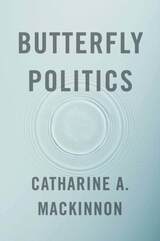
The minuscule motion of a butterfly’s wings can trigger a tornado half a world away, according to chaos theory. Under the right conditions, small simple actions can produce large complex effects. In this timely and provocative book, Catharine A. MacKinnon argues that the right seemingly minor interventions in the legal realm can have a butterfly effect that generates major social and cultural transformations.
Butterfly Politics brings this incisive understanding of social causality to a wide-ranging exploration of gender relations. The pieces collected here—many published for the first time—provide a new perspective on MacKinnon’s career as a pioneer of legal theory and practice and an activist for women’s rights. Its central concerns of gender inequality, sexual harassment, rape, pornography, and prostitution have defined MacKinnon’s intellectual, legal, and political pursuits for over forty years. Though differing in style and approach, the selections all share the same motivation: to end inequality, including abuse, in women’s lives. Several mark the first time ideas that are now staples of legal and political discourse appeared in public—for example, the analysis of substantive equality. Others urge changes that have yet to be realized.
The butterfly effect can animate political activism and advance equality socially and legally. Seemingly insignificant actions, through collective recursion, can intervene in unstable systems to produce systemic change. A powerful critique of the legal and institutional denial of reality that perpetuates practices of gender inequality, Butterfly Politics provides a model of what principled, effective, socially conscious engagement with law looks like.
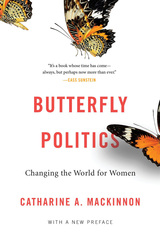
“Sometimes ideas change the world. This astonishing, miraculous, shattering, inspiring book captures the origins and the arc of the movement for sex equality. It’s a book whose time has come—always, but perhaps now more than ever.”
—Cass Sunstein, coauthor of Nudge
Under certain conditions, small simple actions can produce large and complex “butterfly effects.” Butterfly Politics shows how Catharine A. MacKinnon turned discrimination law into an effective tool against sexual abuse—grounding and predicting the worldwide #MeToo movement—and proposes concrete steps that could have further butterfly effects on women’s rights. Thirty years after she won the U.S. Supreme Court case establishing sexual harassment as illegal, this timely collection of her previously unpublished interventions on consent, rape, and the politics of gender equality captures in action the creative and transformative activism of an icon.
“MacKinnon adapts a concept from chaos theory in which the tiny motion of a butterfly’s wings can trigger a tornado half a world away. Under the right conditions, she posits, small actions can produce major social transformations.”
—New York Times
“MacKinnon [is] radical, passionate, incorruptible and a beautiful literary stylist… Butterfly Politics is a devastating salvo fired in the gender wars… This book has a single overriding aim: to effect global change in the pursuit of equality.”
—The Australian
“Sexual Harassment of Working Women was a revelation. It showed how this anti-discrimination law—Title VII—could be used as a tool… It was the beginning of a field that didn’t exist until then.”
—U.S. Supreme Court Justice Ruth Bader Ginsburg
READERS
Browse our collection.
PUBLISHERS
See BiblioVault's publisher services.
STUDENT SERVICES
Files for college accessibility offices.
UChicago Accessibility Resources
home | accessibility | search | about | contact us
BiblioVault ® 2001 - 2024
The University of Chicago Press









